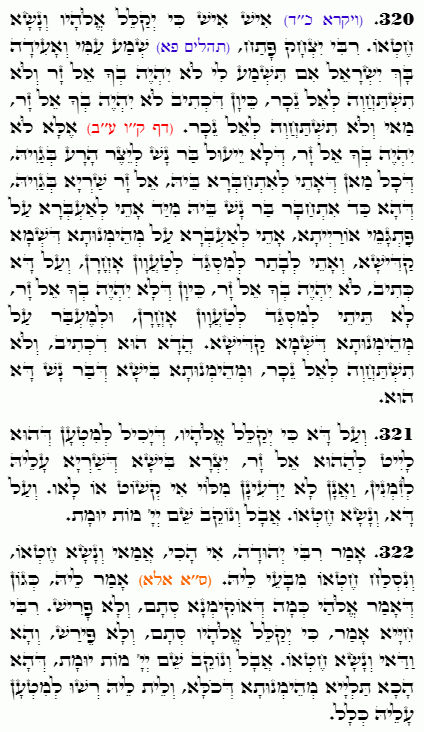Daily Zohar # 4594 – Emor – There shall be no foreign god among you
Daily Zohar 4594

Hebrew translation:
321. וְעַל זֶה, כִּי יְקַלֵּל אֱלֹהָיו, שֶׁיָּכוֹל לִטְעֹן שֶׁהוּא קִלֵּל אֶת אוֹתוֹ אֵל זָר, יֵצֶר הָרָע שֶׁלִּפְעָמִים שׁוֹרֶה עָלָיו, וְאָנוּ אֵינֶנּוּ יוֹדְעִים אִם דְּבָרָיו אֱמֶת אוֹ לֹא. וְעַל זֶה, וְנָשָׂא חֶטְאוֹ. אֲבָל וְנֹקֵב שֵׁם ה’ מוֹת יוּמָת.
322. אָמַר רַבִּי יְהוּדָה, אִם כָּךְ, לָמָּה וְנָשָׂא חֶטְאוֹ? וְנִסְלַח חֶטְאוֹ הָיָה צָרִיךְ לִהְיוֹת! (אֶלָּא) אָמַר לוֹ, כְּמוֹ שֶׁאָמַר אֱלֹהַי, כְּמוֹ שֶׁבֵּאַרְנוּ סְתָם, וְלֹא פֵרַשׁ. רַבִּי חִיָּיא אָמַר, כִּי יְקַלֵּל אֱלֹהָיו סְתָם, וְלֹא פֵרַשׁ, וְזֶה וַדַּאי וְנָשָׂא חֶטְאוֹ. אֲבָל וְנֹקֵב שֵׁם ה’ מוֹת יוּמָת, שֶׁהֲרֵי כָּאן תְּלוּיָה אֱמוּנַת הַכֹּל, וְאֵין לוֹ רְשׁוּת לִטְעֹן עָלָיו כְּלָל.
.
Zohar Emor
Continued from previous DZ
#320
“If any man curses his God, he will bear his sin” (Leviticus 24:15). Rabbi Yitzchak opened with the verse,
Psalm 81:9,10
“שְׁמַע עַמִּי וְאָעִידָה בָּךְ יִשְׂרָאֵל אִם תִּשְׁמַע לִי.”
“לֹא יִהְיֶה בְךָ אֵל זָר וְלֹא תִשְׁתַּחֲוֶה לְאֵל נֵכָר.”
“Hear, my people, and I will testify against you, Israel, if you will listen to me!”
“There shall be no foreign god among you, nor shall you bow down to a foreign god.”
He asked, “Since it is written, ‘There shall be no foreign god among you,’ what is the meaning of ‘nor shall you bow down to a foreign god’?”
He answered, “The phrase ‘There shall be no strange god among you’ means that a person should not allow the evil inclination to enter within him. For anyone who connects with the evil inclination allows a foreign god to reside within him. When a person becomes connected to it, he immediately begins to transgress the words of the Torah and the faith in the Holy Name. Subsequently, he will come to bow down to a foreign god. Therefore, it is written, ‘There shall be no foreign god among you.’ If there is no strange god within you, you will not come to bow down to a foreign god or transgress the faith in the holy Name. This is what is meant by ‘nor shall you bow down to a foreign god.’ This refers to the false belief of a person.”
#321
And therefore, if one curses his God, he can claim that he cursed that strange god, which is the evil inclination that sometimes resides within him. We do not know whether his words are true or not, and therefore, ‘he shall bear his sin’ only. But if he blasphemes the Name of Hashem, he shall surely be put to death, as it is written;
Leviticus 24:16
“וְנֹקֵב שֵׁם יְהוָה מוֹת יוּמָת רָגוֹם יִרְגְּמוּ בוֹ כָּל הָעֵדָה כַּגֵּר כָּאֶזְרָח בְּנָקְבוֹ שֵׁם יוּמָת.”
“And whoever blasphemes the name of YHVH shall surely be put to death. All the congregation shall certainly stone him, the stranger, and the man born in the land. When he blasphemes the name of YHVH, he shall be put to death.”
#322
Rabbi Yehuda said, “If it refers to the evil inclination, why does it say, ‘he shall bear his sin’? It should have said, ‘his sin shall be forgiven.’ He answered, ‘This applies to someone who said ‘my God’ without specifying, as we have explained. He did not clarify that he meant a strange god, which is the evil inclination. Therefore, it cannot be written, ‘his sin shall be forgiven,’ because it is uncertain.'”
Rabbi Chiya said, “If he curses his God in a general way without specifying, it certainly means ‘he shall bear his sin’ because we do not administer punishment in such a case. But if he blasphemes the Name of YHVH, ‘he shall surely be put to death’ because this concerns the faith of all, and he has no right to claim that he meant another god. He cannot say that he intended a different god.
{||}

 Previous: Emor
Previous: Emor

